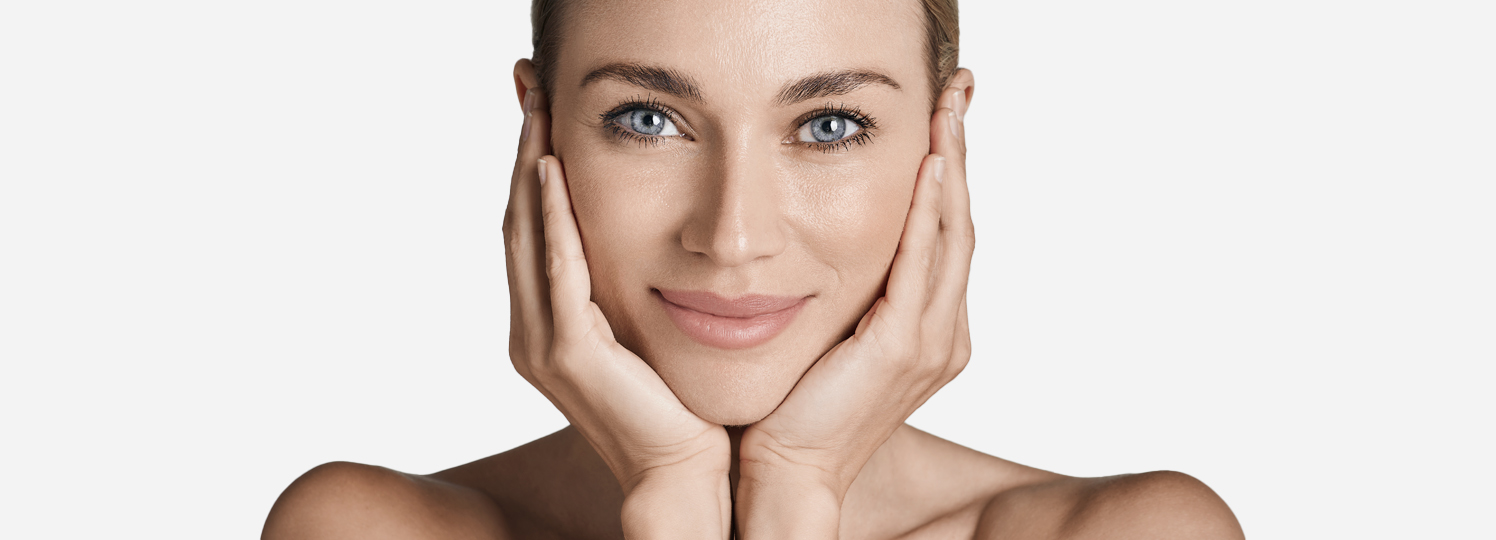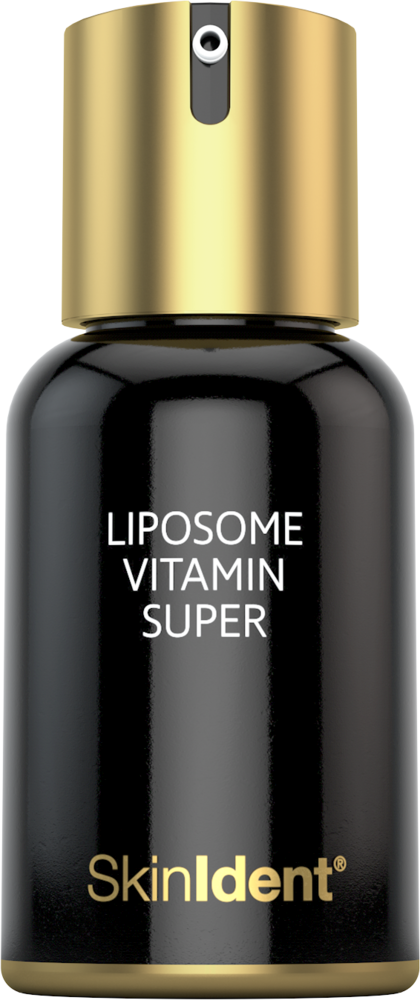

Basic Care



Basic Care
It is a true blessing for extremely difficult skin with dry patches, disturbed skin barrier function, flaking and redness. It can also be used for normal skin. Skin-friendly vitamins such as natural vitamin E, vitamin A, panthenol (provitamin B5), vitamin B12, vitamin C and biotin (vitamin H) rebalance the skin, protect it and optimise its moisture content. The very high vitamin content gives this highly effective product its red colour.
Application of SkinIdent Liposome products
For oily to normal skin it is adequate to only apply one of the three liposome products, especially in warm climates. For normal to dry skin, especially in cold climates, after the application of a liposome product skin should be cared for and pampered with one of the six SkinIdent creams described below.
30 ml Bottle
Art.-Nr. 9044
10 ml Tube
Art.-Nr. 9544
Aqua, Caprylic/Capric Triglyceride, Alcohol, Glycerin, Urea, Lecithin (and) Alcohol, D-alpha Tocopheryl Acetate, Panthenol, D-mixed-Tocopherols, Retinyl Palmitate, Sodium Ascorbyl Phosphate, Biotin, L-Prolin, Lactic Acid, Sodium Hyaluronate, Cyanocobalamin, Allantoin, Citric Acid, Sodium Hydroxide
Aqua:
Water. It accounts for around 65% of the weight of the human body and is therefore of fundamental importance for bodily functions, including those of the skin. In many cosmetic products (aqueous solutions, cleansers, emulsions), water is the ingredient with the largest proportion of the formulation in terms of quantity and forms the basis of the aqueous phase in emulsions. Water is a good solvent for polar (hydrophilic) substances such as alcohols, water-soluble vitamins or salts. For use in cosmetic products, the water used is generally pre-treated to remove microorganisms that could lead to spoilage of the product or dissolved salts that may impair the stability of emulsions or gels (sterilization and desalination).
Caprylic/Capric Triglyceride:
Vegetable neutral oil (triglyceride) with short-chain fatty acids. Has moisturizing properties.
Alcohol:
Ethyl alcohol: Body identical. Has a refreshing and antibacterial effect. Also serves as a solvent for other ingredients. Contrary to claims to the contrary, there is no risk of a drying effect on the skin at normal application concentrations!
Urea:
The water-soluble urea is used in numerous cosmetic products. Urea is a component of the natural moisturising factors of the horny layer (content between 7 % and 12 %; up to half lower in chronically dry skin) and has a high water-binding capacity. It contributes to sustained moisturisation of the skin and reduces transepidermal water loss. Urea has a keratoplastic effect, in higher concentrations it has a keratolytic effect and is therefore also used in the care of skin affected by psoriasis or atopic dermatitis (neurodermatitis). Urea is also able to reduce the irritating potential of surfactants.
Lecithin (and) Alcohol:
Lecithin concentrate in alcohol, can form liposomes, in creams as a high-quality co-emulsifier
D-alpha Tocopheryl Acetate:
Natural vitamin E acetate; storage form in the skin, is converted into the active form by dissolving the acetate bond; antioxidant with skin-protecting properties, e.g. against UV radiation, retains moisture, delays premature skin ageing
Panthenol:
D-panthenol = provitamin B5: Improves and increases the skin's ability to retain moisture, has an anti-inflammatory effect, reduces or inhibits itching. Stimulation of epithelialization: Small wounds (shaving), skin abrasions, blisters heal better. When used in hair care products, it is not only deposited on the hair and scalp, it also penetrates them and has a long-term effect. As pantothenic acid is an important component of healthy hair, the precursor D-panthenol serves as “food for the hair” according to scientific studies. It provides the hair with long-lasting moisture, improves the combability of the hair, reduces the formation of split ends, improves the condition of damaged hair, thickens the hair and gives it shine. The brittleness of fingernails is reduced.
D-mixed-Tocopherols:
Is the name of a mixture of natural tocopherols (vitamin E; D-alpha-, beta-, gamma- and delta-tocopherol). Vitamin E is the most important skin protection vitamin, which protects the skin from UV rays and oxygen radicals.
Retinyl Palmitate:
Is the storage form of vitamin A, which is converted into free vitamin A in the skin. It stimulates cell division and therefore has a strong regenerative effect, particularly on pre-aged skin and with prolonged use. Studies have even shown an increase in the collagen content of the skin, a slight reduction in wrinkles and an increase in skin elasticity.
Sodium Ascorbyl Phosphate:
Highly effective antioxidant and vitamin C donor for the skin
Storage form of vitamin C as a phosphate ester. Water-soluble vitamin with antioxidant properties. It acts against cell-damaging free radicals, protects unsaturated fatty acids from oxidation, is essential for the formation of collagen and thus the entire connective tissue as well as for the function of the immune system. Together with vitamin E, it is very suitable for preventing the formation of nitrosamines.
Biotin:
Vitamin H, important for the normal function of skin and hair
L-Prolin:
2-Pyrrolidine-4-carboxylic acid: Is an amino acid, predominantly a component of human collagen, is one of the skin's natural moisturizing factors.
Lactic Acid:
Lactic acid. Occurs as a metabolic product in the body and on the skin, has a peeling effect on the horny layer in higher concentrations and at a low pH value of 2 to 3, supports the moisture content in buffered form (physiological pH value of the skin approx. 5.5) and preserves the skin's protective acid mantle.
Sodium Hyaluronate:
Sodium salt of hyaluronic acid. Natural moisturiser with skin-smoothing properties, important natural component of the lower skin layers (dermis). Formerly produced from rooster combs, now produced in better quality by biotechnology.
Cyanocobalamin:
Vitamin B12: A vitamin that can only be produced by bacteria, used in skin care to regulate skin irritations, obtained biotechnologically.
Allantoin:
Allantoin is a body-identical, water-soluble substance and is chemically related to urea. It is found in various plants but is now produced synthetically for use in cosmetics. Its most important property is the stimulation of new cell formation. It promotes collagen formation, skin regeneration and wound healing, stimulates desquamation, smoothes the skin and can have a soothing effect on atopic dermatitis.
Citric Acid:
Citric acid. Biotechnologically produced body-identical active ingredient. Occurs in the metabolism of the human organism and can also be found in low concentrations on the skin. It protects the skin from oxidative stress, supports the product protection of the antioxidants and regulates the pH value of the product.
Sodium Hydroxide:
Sodium hydroxide. Used to adjust the pH value of cosmetic products. Sodium and hydroxide ions are identical to the body.